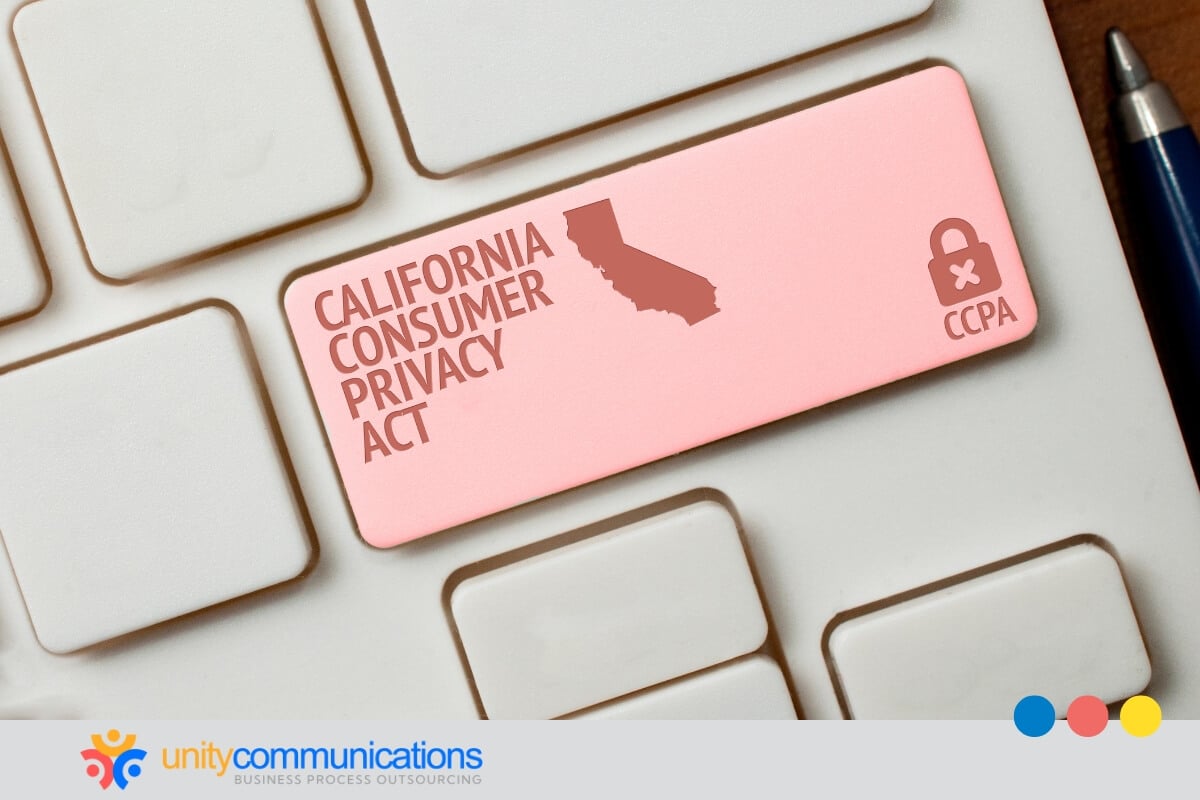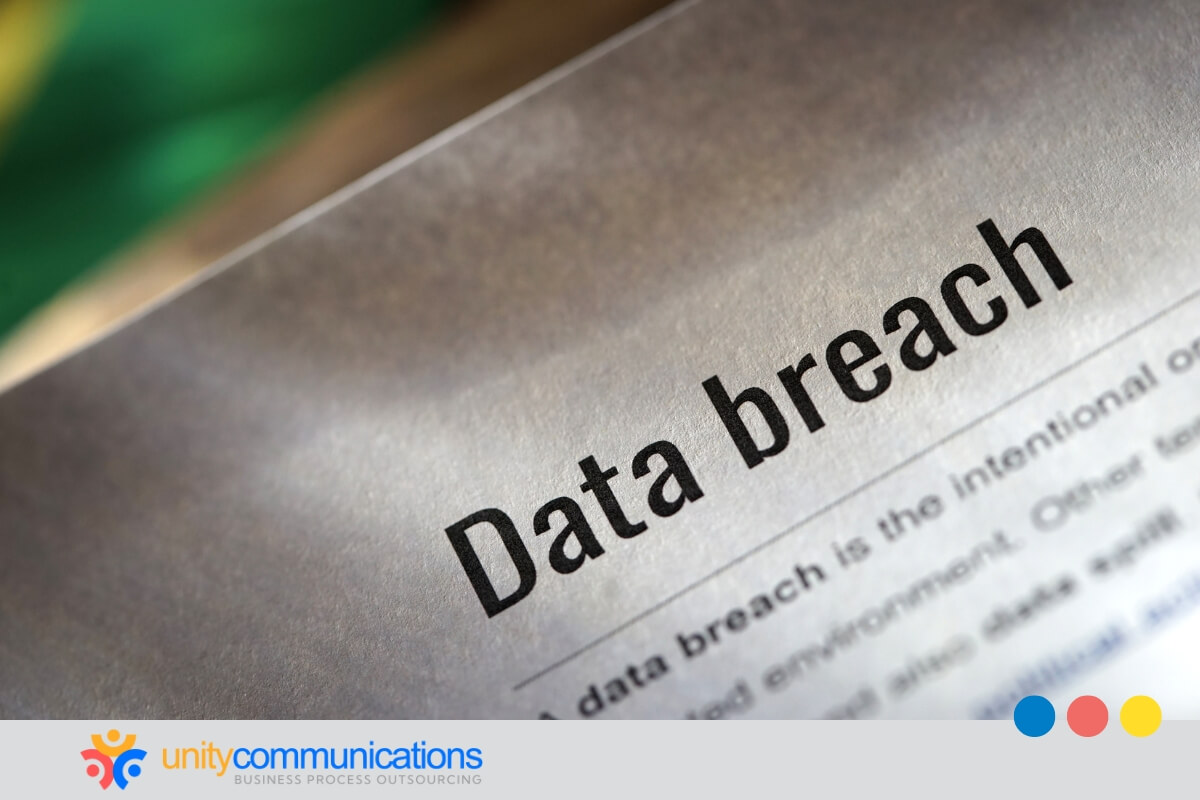IN THIS ARTICLE
Table of Contents
Suppose your company wants to streamline operations and reduce expenses but does not wish to seek a third-party agency beyond the United States borders. Cue onshore business process outsourcing (BPO), a cost-effective solution to boost daily productivity.
Before maximizing this strategy, you must understand the legal landscape of outsourcing in the country. One wrong turn in this complex process might put you at risk of fines and lawsuits.
Avoid such pitfalls by joining us in exploring U.S. outsourcing laws. Below, we detail the rules and regulations that can make or break your BPO investment.
The Absence of U.S. Outsourcing Laws

The federal government does not regulate BPO transactions per se. However, that does not mean service providers can freely do what they want. State laws exist to oversee the activities they perform with local clients.
Some federal regulations may apply to the terms of BPO service agreements, such as data privacy. Other rules also apply to the client company’s industry, whether financial services, information technology (IT), or healthcare. Below are some federal regulations that may be considered U.S. outsourcing laws:
- The Coronavirus Aid, Relief, and Economic Security (CARES) Act might have BPO restrictions on companies that participated in the Main Street Lending Program in 2020. The law might restrict certain enterprises that received loans or monetary benefits from the program from adopting offshore outsourcing.
- The Health Insurance Portability and Accountability Act of 1996 (HIPAA) implements strict security and privacy standards to safeguard protected health information (PHI). The law requires healthcare BPO companies and clients to sign business associate agreements (BAAs) to secure PHI.
- The Health IT for Economic and Clinical Health Act of 2009 (HITECH) outlines specific data breach notification requirements. BPO organizations must promptly report electronic PHI breaches to affected individuals and the Department of Health and Human Services (HHS). The act ensures transparency and accountability.
- The Gramm-Leach-Bliley Act of 1999 (GLBA) improves consumers’ financial data privacy and security. The law mandates financial institutions to sign contracts with their BPO partners. These agreements should include provisions requiring the provider to comply with GLBA’s data collection and usage transparency rules.
- The Worker Adjustment and Retraining Notification Act of 1988 (WARN) requires employers to give their employees written notice of layoffs. Although not industry-specific, the WARN also directs BPO firms undergoing significant workforce changes to comply with a 60-day notice requirement.
- The Telephone Consumer Protection Act of 1991 oversees telemarketing, automated calling, and prerecorded voice messaging. The law instructs BPO telemarketing providers to obtain customer consent before making outbound calls. They must also adhere to the National Do-Not-Call Registry rules.
- The Uniform Trade Secret Act (UTSA) is a legal framework to ensure consistency for the state-level security of trade secrets. BPO providers handle confidential data on behalf of their clients. The law protects against unauthorized access and disclosure if such information falls under the criteria of a trade secret.
State-specific Regulations on Outsourcing

Understanding the nuance of state-specific regulations is crucial as we navigate the complex landscape of U.S. outsourcing laws. For any BPO role and responsibility, each U.S. state has its own business practice rules. Let us discuss some of them in the succeeding sections.
California Consumer Privacy Act (CCPA)
The CCPA gives California residents greater control over the personal information they share with businesses. As of January 1, 2023, this comprehensive state law provides consumers with the listed data privacy rights:
- Know the types of personal data that companies collect
- Understand how companies use and share their personal data
- Delete their personal data
- Opt out of the sale or sharing of personal data
- Correct inaccurate personal data submitted to businesses
- Limit the use and disclosure of sensitive personal data
Although the CCPA primarily covers companies that deal with consumer data, it still has implications for BPO providers. The law mainly applies to providers handling customer data, such as call centers and marketing agencies. Here’s how:
- Local businesses must have service-level agreements (SLAs) with providers. The contract should outline the BPO firm’s obligations to protect confidential consumer data and ensure privacy.
- BPO companies must align their data processing measures with the CCPA. The law limits how customer information is collected, used, and disclosed. Thus, providers must respect consumers’ rights to control and access their data.
- Providers must implement critical techniques to secure customer data. They must align security measures with CCPA standards to defend personal data against cyber threats.
- Contractors must adhere to the CCPA’s nondiscrimination principle. The regulation prohibits companies from unfairly treating consumers who exercise their privacy rights.
Arizona Civil Rights Act (ACRA)
The ACRA facilitates fair employment practices similar to those enacted under federal law. This state-level mandate covers businesses with 15 or more employees. It bans employment discrimination based on protected characteristics, such as:
- Race
- Color
- National origin
- Religion
- Sex
- Age
- Disability
Although this act indirectly impacts outsourcing processes in Arizona, local BPO companies should stay informed of developments in the state’s civil rights and employment practices. They should know and engage with the appropriate department to address potential discrimination complaints.
Legal Arizona Workers Act (LAWA)
The LAWA forbids a company from hiring undocumented employees. This ban also includes employers using an independent contractor or subcontractor. This indirect U.S. outsourcing law requires enterprises and BPO providers to perform the enumerated practices:
- Register for the E-Verify system. The platform helps validate the status of employees hired after December 31, 2007. BPO companies operating and hiring workers in Arizona must also register.
- Integrate the E-Verify process into hiring procedures. Enterprises and BPO companies must screen candidates using the E-Verify platform. This verification also applies to BPO employees working with state agencies and private companies.
- Maintain records of employment eligibility verification through E-Verify. Employers, including BPO companies, must keep the documents for the duration of an employee’s engagement or at least three working years. Government authorities must be able to access it for inspection whenever necessary.
State labor law penalizes businesses that intentionally hire unauthorized employees. BPO firms that fail to adhere to E-Verify requirements or knowingly employ uncertified workers also face sanctions, such as business license suspension or revocation.
New York SHIELD Act
The New York Stop Hacks and Improve Electronic Data Security Act (SHIELD Act) amends the state’s Information Security Breach and Notification Act of 2005. The latest law strengthens New York’s cybersecurity regulations by requiring any person or business to protect the following:
- Social Security number
- Driver’s license number
- Account number
- Biometric information
- Username or email address
- Password
As an indirect U.S. outsourcing law in New York, the SHIELD Act demands that BPO companies handling private data execute administrative, technical, and physical safeguards. These measures may include the following practices:
- Assign an employee or team to lead the security program.
- Train employees on the security program’s practices.
- Evaluate risks in network, software design, and information processing.
- Detect and respond to system failures or cyberattacks.
- Regularly test and monitor the effectiveness of critical system controls and procedures.
- Assess threats to information storage and disposal.
- Combat unauthorized access to or use of private information during processing.
Furthermore, the state law directs stakeholders to notify the affected consumers after discovering a data breach. BPO companies and their clients must send prompt notifications that match the legitimate needs of law enforcement agencies.
Other Crucial U.S. Outsourcing Legal Matters to Note
Beyond the auxiliary U.S. outsourcing laws discussed, other general regulatory matters also influence BPO activities in the country. Each framework has implications for BPO contractors and clients, from procurement processes to tax-related rules. Find out below what other BPO legal matters exist in the U.S.:
- BPO procurement procedures. Acquiring outsourcing services involves extensive provider qualification or selection. The process may start with a request for information (RFI) and be followed by a request for proposal (RFP), or it can begin directly with an RFP.
- Service agreement standards. A master service agreement (MSA) is the most widely used legal structure for a BPO deal. It sets general provisions governing all statements of work (SOWs).
- Contractual obligation rules. State and federal laws do not regulate the duration of BPO contracts. However, parties involved typically accept contract terms ranging from three to 10 years. The period varies according to the nature and scope of work.
- Intellectual property (IP) regulations. BPO contract terms usually protect each party’s IP rights. Specific statutory rules for certain IPs, such as patents, copyrights, and trademarks, add extra protection.
- Tax mandates. Depending on the states where the project takes place, BPO services may be subject to local sales and use taxes. Each party is responsible for the taxes on their income and assets in their jurisdiction.
Legal Battles Over Outsourcing

Despite the lack of centralized U.S. outsourcing laws, BPO companies remain directly liable under some federal rules. Their accountability is vital because data breaches impact client organizations and average consumers.
Some providers have encountered bad press due to such incidents, while others have faced lawsuits over data breaches. Most BPO companies have spent millions of dollars on mitigation efforts and settlements.
Due to the high risk of data breaches among third-party providers, operating executives and security experts recommend best practices to avoid cyberattacks. They suggest the following methods to better handle sensitive information:
- Specify data security and privacy obligations.
- Perform frequent vulnerability scanning across critical systems.
- Update software and drivers regularly.
- Encrypt confidential data.
- Implement data backup and disaster recovery strategies.
- Execute robust multifactor authentication techniques.
However, note that most BPO agreements resort first to informal resolutions during disputes. Sometimes, parties escalate to a management-to-management discussion before proceeding to more formal action—litigation or binding arbitration.
The Bottom Line
U.S. outsourcing laws exist to ensure smooth collaborative processes between providers and clients. While the federal government does not have a core rule for the BPO sector, state regulations oversee some critical procedures in this segment.
Amid the lack of standardized rules, BPO firms in the U.S. still encounter lawsuits and fines, especially when sensitive data is involved. Breaches that happen within their scope of operations lead to legal challenges. BPO providers and clients can solve issues through talks before moving to more formal settlements.
Let’s connect if you seek more clarification about the legal landscape of outsourcing in the U.S. As a BPO company with headquarters in the country, Unity Communications can give you more insights into this matter. The award-winning provider also offers cost-effective solutions to meet your daily operational needs.





